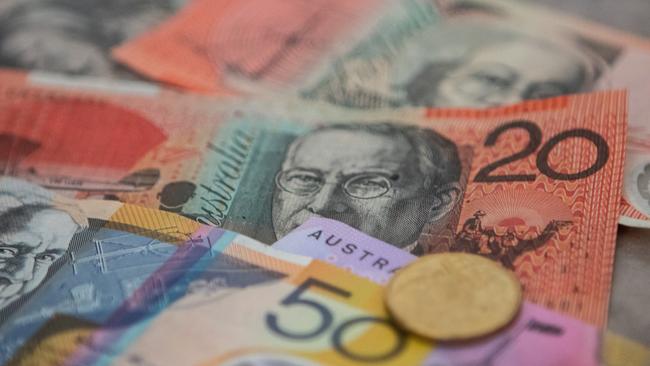Federal Budget 2022-23: What’s in the budget for regional Victoria
Among the announcements was $3.5 billion worth of new commitments to road infrastructure across the state. SEE THE PROJECTS THAT MATTER TO YOU.

Leader
Don't miss out on the headlines from Leader . Followed categories will be added to My News.
Truckies and commuters are set to benefit from a multibillion-dollar spending spree aimed at improving regional roads across the state as part of Tuesday’s Federal Budget.
$3.5 billion in new funding for major infrastructure was announced by Treasurer Josh Frydenberg on Tuesday night, highlighting improvements in freight routes and safeguards for motorists.
The works form part of a 10-year, $120 billion plan to improve regional infrastructure, and in the next financial year, will cost $21 billion nationwide.
NEW FUNDING FOR VICTORIAN INFRASTRUCTURE PROJECTS
- $1.5 billion for the Beveridge Interstate Freight Terminal and connecting roads
- $920 million for the Outer Metropolitan Ring Rail South
- $740 million for Western Interstate Freight Terminal
- $45 million for the Ballarat to Ouyen corridor
- $109.5 million for Mickleham Road
- $23.1 million for Canterbury Road
- $101.7 million for road and infrastructure projects across the state, through local councils
Meanwhile, billions of dollars in previously-announced road infrastructure were also locked in, including $3.1 billion for two new intermodal terminals at Beveridge and Truganina, $1.8 billion for the North East Link, $1.1 billion for south-eastern and northern suburban roads, $448 million for the Gippsland Rail Line, and $292 million for Barwon Heads Road.
Deputy Prime Minister Barnaby Joyce said the intermodal terminals would free up roads in Melbourne and benefit regional businesses up the country’s eastern side.
“These terminals will help remove around 5,500 truck movements per day from metropolitan arterial roads in Melbourne, reducing congestion and emissions across the CBD, and improving safety,” he said.
“These investments will improve supply chain productivity and reliability while unlocking freight efficiencies across the broader national network, including the Inland Rail.
“They will better connect regional businesses and exporting industries with domestic and international markets, so that our nation can continue to generate the wealth that will make us stronger.”
The newly-announced projects bring Federal Government spending on similar infrastructure in Victoria to more than $35.5 billion since 2013.

Money for other regional projects
Funding allocated to other regional projects or to support state programs included:
- $20 million for the Albury-Wodonga Regional Deal ($83.2 million over five years from 2022-23)
- $4.5 million for the Bendigo Airport Terminal Redevelopment through the Community Development Grants Programme
- $600,000 for the Shepparton FoodShare through the Community Development Grants Programme
- Another $7.5 million, to total $15 million, to help build a football centre at Latrobe University in Bundoora
- $48 million for the Geelong City Deal, which may be spent on the Shipwreck Coast Master Plan, Great Ocean Road projects, and projects in the Geelong city centre ($114.3 million from 2022-23 to the end of 2024-25)
Mr Joyce said work was progressing on a North West Melbourne City Deal, by which the Federal Government would invest in projects in that region.
Regional Victoria to benefit from ‘growth fund’
A $2 billion fund has been developed to target investments in regional communities across the country to “unlock growth prospects for industries and businesses”.
The Regional Accelerator Program will provide $142 million in education infrastructure, $25 million for a Defence Capability Improvement Grant program, and $9 million for a Sovereign Industrial Capability Priorities Grants program.
Treasurer Josh Frydenberg said: “The government has identified 12 programs where it will target investments through a $2.0 billion Regional Accelerator Program to further grow Australia’s regional communities.
“This will empower our strong and dynamic regions to capitalise on existing and emerging opportunities.
“It will also unlock growth prospects for industries and businesses to ensure thriving regions are internationally competitive.”
Mr Frydenberg said the government would provide $500 million to regional manufacturers.
“This will enhance Australia’s international competitiveness by assisting regional manufacturers to translate good ideas into commercial success,” he said.
Meanwhile, additional funding has been secured for a range of regional initiatives including the Critical Minerals Accelerator Initiative ($200.0 million), Regionalisation Fund ($500.0 million), Modern Manufacturing Initiative ($500.0 million), Recycling Modernisation Fund ($30.3 million), Australian Apprenticeships Initiatives ($144.1 million), National Centre for Digital Agriculture, Innovation and Adoption Hubs ($30.0 million), and Regional Trailblazer Universities ($118.9 million).

Health
In its budget, the Federal Government committed to securing additional Covid vaccines to protect those at the most risk of severe illness; it will also invest in transmission prevention and testing to contain outbreaks in high-risk settings.
“Already, the government has distributed over 161 million units of PPE and over 26.2 million RATs to aged care facilities,” budget papers said.
“To assist Australians with a disability to monitor for COVID-19 and manage transmission risks, the government is providing 5.5 million RATs to National Disability Insurance Scheme (NDIS) Supported Independent Living residents and workers.”
Support for health and vaccination services for rural and remote Indigenous communities, who are at risk of severe illness from COVID-19, is being extended at a cost of $43.3 million.
The government will ensure the costs of taking a COVID-19 test to attend work are tax-deductible for individuals from July 2021, while fringe benefits tax will not be incurred by businesses that provide Covid-19 tests to employees for them to attend work.
Murray-Darling Basin
The government will provide a further $139.9 million over three years from 2021 to sustain the Murray-Darling Basin by working to improve river health and to stimulate the economies of surrounding communities.
The funding includes $97 million over two years from 2022 for infrastructure projects to improve river health and promote agricultural productivity, as well as $35.1 million over three years to deliver water to important ecosystems in the Edward-Wakool region.
The government also allocated $3.2 million over two years from 2022 to improve water compliance and $2.1 million to create a water market reform plan expected to improve the governance of Basin water markets.



